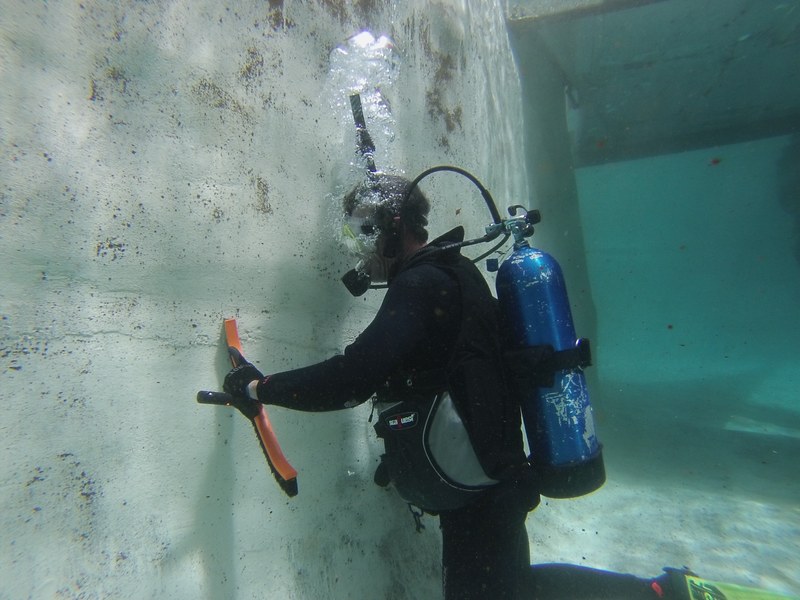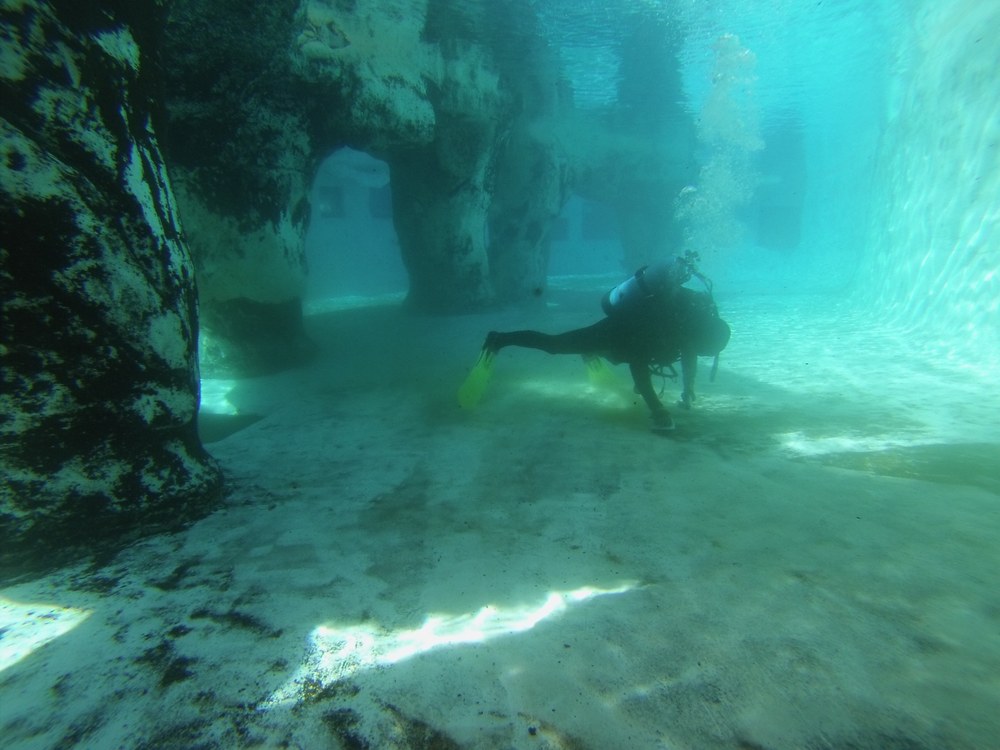
Below the Surface
ABQ BioPark water quality crew dives to keep animals—and their living environment—healthy.
Visit the ABQ BioPark Zoo on a Tuesday morning and you just might catch a glimpse of something odd swimming around in the seals and sea lions pool.
No, you won't spot Nessie, but you may see a few decked out scuba divers floating past the viewing window.
"The kids watching us through the underwater windows are always fun," said diver Marlin Curry. "They’re often a little shocked when we wave to them, and then they excitedly wave back."
As part of the ABQ BioPark's water quality crew, these divers keep the water at the Aquarium, Zoo and Tingley Beach clean. One of their tasks is to dive into the tanks at the Aquarium, seals and sea lions and polar bears to scrub algae and monitor the water.
The team's job is vitally important. In addition to cleaning, divers make sure the water has got the “right stuff” in it.
“We try to mimic nature to supply a habitable environment for the animals we’re in charge of,” said Steve Senac, ABQ BioPark Water Quality Supervisor. This includes sampling water every day for temperature, pH, and nitrate, ammonia and chlorine levels.
A labyrinth of pipes and tanks behind the seals and sea lions exhibit demonstrates the BioParks's sophisticated automated water management—Senac said the systems reclaim, treat and filter the water, as well as backwash one filter a day to keep the pipes clean. From behind a computer, Senac can evaluate what’s going on, monitoring factors like water flow rate and pump status.
He and several members of the team receive text messages when any of the water systems require attention. For instance, if a tank is low on water, Senac's phone will light up with an alert. One of the crew members is on call at all times.
Senac said while all of the work the water quality department does is important, that it's “a little more intense” at the Aquarium because these sea creatures generally don’t breathe air and are completely reliant on their underwater habitat.
“You’re creating an ocean environment for them to live in. The fish are totally dependent on what we’re supplying them,” Senac said. “If we’re not doing our job, they’re not staying alive.”
"If we're not doing our job, they're not staying alive."
During the warmer months, the group dives into the seals and sea lions tank once a week and polar bears once a month. February-October sees just one dive per month in seals and sea lions because the water can be cold. The Aquarium tanks get weekly—and sometimes daily—attention, based on each tank’s needs. The crew also monitors water at Tingley Beach.
Safety is a priority. Each diver is CPR certified twice a year. They also receive a variety of other education including oxygen, defibrillation and scuba training.
Protocol dictates there be two to three people in the water at any given time—in the rare case of a lone diver, one person will monitor the dive from above. Also, for extra precaution, a keeper is always present during dives. Senac said each group member tries to keep other divers in their line of sight so they can help out if someone is in distress.
The crew also takes precautions when swimming with animals. For instance, if Tommy, a 600-pound sea lion, decides he does not want to exit the pool before their Tuesday cleaning, they will not enter. While they can swim with the smaller, older seals, Tommy poses too much of a risk because of his size. The crew also cleans the polar bear pools with the bears safely inside their own locked bedrooms. As for swimming with sharks at the Aquarium, Senac said he and the other divers are “well out of their food zone.”
If any of the animals approach the divers while they’re diving, Senac said they try not to interact.
“They’re inquisitive, but for the most part they leave us alone,” Senac said. “They’re not pets. We don’t approach them or play with them. That’s not our job. We’re here to clean.”
Despite having a job to do, team members can't help but enjoy the dives.
"I always look forward to dive days," said Curry. "That first plunge into weightlessness, slowly sinking to the bottom is a great feeling. We’re there to work, and we do, but for me it’s hard to not think of it as fun."
Story: Tina Deines


